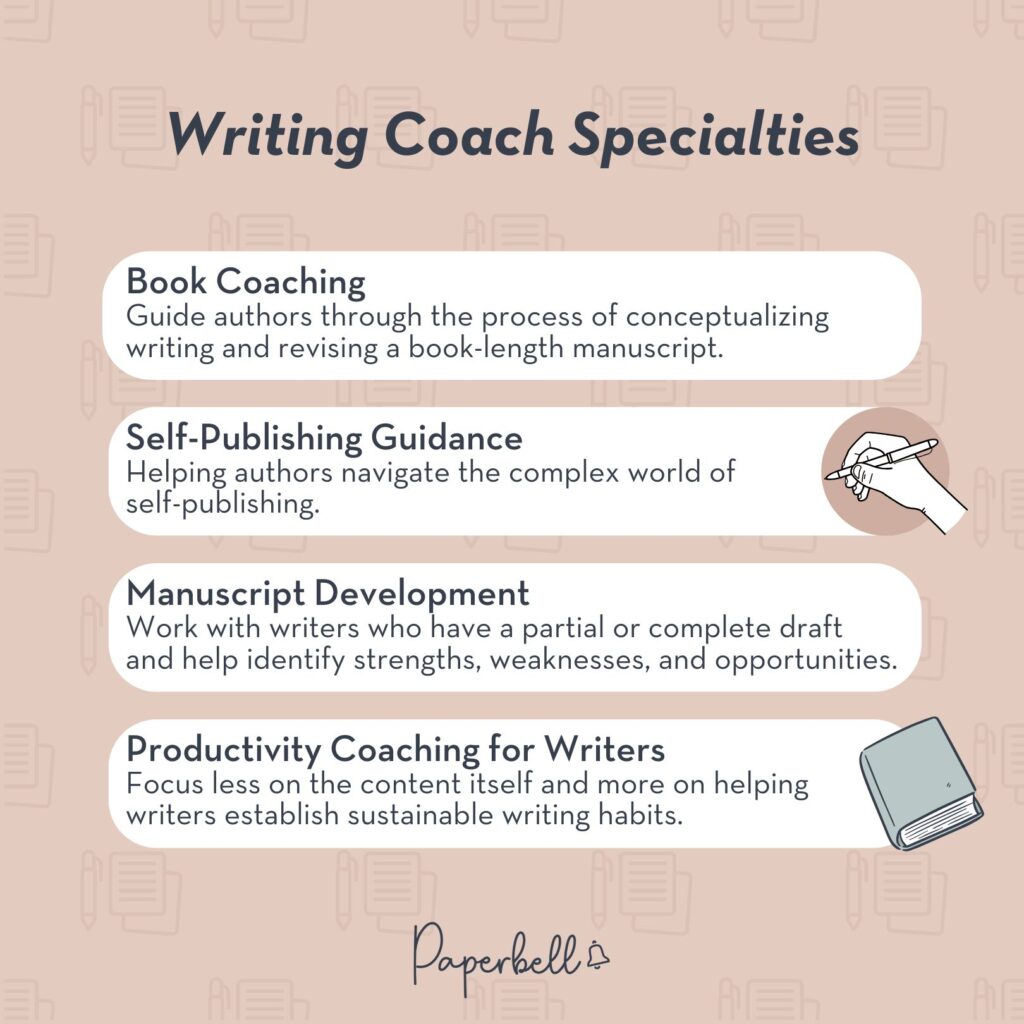If you’re an aspiring or established writing coach, now is the time to build your coaching business.
People are pursuing writing careers—from novels to memoirs to thought-leadership content—and so, the demand for writing coaches is on the rise.
However, success in this field requires more than good writing skills. Writing coaches who are thriving treat their coaching expertise as a business.
In this guide, you’ll learn about the business side of writing coaching, from what services you’ll offer to how to package and price them.
What Does a Writing Coach Actually Do?
A writing coach is a mentor, guide, and accountability partner who helps writers develop their skills, get past creative blocks, and become productive.
Writing coaches don’t just help writers fix an existing manuscript. They work with them throughout the creative process.
Successful writing coaches have the following qualities:
- Strong analytical reading skills
- Communication skills
- Empathy and emotional intelligence
- Knowledge of story structure and writing craft
- Project management skills
- Business acumen
Different Writing Coach Specialties

The beauty of writing coaching is you can specialize in any area that aligns with your expertise and interests. Here are some specialties to consider:
- Book Coaching: As a book writing coach, you guide authors through the process of conceptualizing writing and revising a book-length manuscript. It often includes developmental feedback on plot, character, structure, and voice.
- Self-Publishing Guidance: You’ll be helping authors navigate the complex world of self-publishing, from formatting manuscripts to choosing distribution platforms, designing covers, and marketing their finished books.
- Manuscript Development: You’ll work with writers who have a partial or complete draft and help identify strengths, weaknesses, and opportunities for improvement. It includes feedback on plots, character development, pacing, and thematic elements.
- Productivity Coaching for Writers: You can focus less on the content itself and more on helping writers establish sustainable writing habits, overcome procrastination, and create realistic schedules.
How Writing Coaching Differs from Editing
It’s important to clarify the difference between coaching and editing.
Editors work primarily with completed manuscripts. They focus on improving what’s already on the page through developmental editing, line editing, copyediting, or proofreading.
Writing coaches, on the other hand, work with the writers themselves. They help authors develop their skills, confidence, and creative process. While coaching often includes feedback on writing, it’s more holistic. Its core is addressing the writer’s goals, challenges, and growth areas.
Many successful writing coaches offer both services, but being clear about the difference will help you set proper expectations with your clients.
Setting Up Your Writing Coach Business
Turning your writing expertise into a coaching business requires some foundational work. Here’s how to get started:
Getting Qualifications and Credentials That Count
There are no standardized certification or licensing requirements for writing coaching like some life coaching professions. Your credibility will come from:
- Your own writing experience and publications
- Your educational background in writing, literature, or related fields
- Any specialized training in coaching methodologies
- Testimonials and success stories from previous clients
- Your professional experience in related fields (publishing, teaching, editing)
While formal credentials can help establish credibility, your actual coaching results will matter more to potential clients.
Deciding on Your Niche
The most successful writing coaches specialize. So, choose a niche. Your choice can be based on:
- Genre specialization: What do your target clients write about? Fiction (romance, mystery, science, etc.) or non-fiction (memoirs, self-help, business books)?
- Audience specialization: Who will you help? First-time authors, academic writers, business professionals?
- Goal specialization: What will you help them achieve? Finish a first draft, revise a manuscript, or prepare for submission to literary agents?
- Process specialization: What writing techniques and areas will you focus on? Productivity, creativity, structural development?
Your niche should align with your expertise and the clients you enjoy working with. And you can always add more ideas to your business plan as your brand grows.
Using Essential Tools for Writing Coaching
Setting up your business as a writing coach doesn’t have to be complicated, but it has to be efficient.
Here are the essentials you’ll need to get coaching clients:
- Landing page or website to show your services, testimonials, and booking options
- Scheduling software to manage client bookings
- Document-sharing app for collaborative projects, contracts, and other resources
- Project management software to track client’s progress
- Client management system to manage client handling and communication
- Video conferencing tool (such as Zoom, Google Meet, etc.) for virtual coaching sessions
- Payment processing options (such as Stripe or PayPal) to get paid
When you sign up for Paperbell, you get access to the first five essentials. For the remaining two, it integrates with your existing options for easy admin tasks.
Creating Irresistible Writing Coach Packages
How you package your services affects both your income and your clients’ results. Here are some coaching packages to consider:
One-on-One Coaching Session Structures
This involves personalized support for each writer’s specific needs.
You can offer this as standalone coaching sessions for writers who want feedback on specific issues, as well as discounted session bundles to encourage longer-term commitment.
Many coaches also offer intensive VIP day options where clients can make significant progress in a shorter period of time. This can help them focus on activities like outlining an entire book or revising a tough section of their manuscript.
Group Writing Workshops
Group coaching allows you to coach multiple clients at once.
These can be:
- Time-limited workshops on specific writing skills
- Ongoing membership for regular feedback and accountability
- Exclusive mastermind groups for serious writers working on big projects.
Group coaching also diversifies your income and creates a writing community among your clients.
Manuscript Review Services
Manuscript review services bridge the gap between coaching and editing.
When you provide structured feedback on partial or complete manuscripts, you give writers direction for improvement.
Here are some examples of what your writing coaching services might include:
- Annotated manuscript assessments
- Written analysis
- Revision planning sessions
These packages are great for writers who want specific input rather than ongoing coaching.
Ongoing Accountability Packages
Many writers don’t struggle with skill but with consistency and follow-through.
Accountability packages with regular check-ins, progress tracking, and adjustable goals can help clients stay on track.
You can offer these in different timeframes (monthly, 90-day sprints, or annual mentorships) depending on the scope of your clients’ projects and the level of support they need.
Book Completion Programs
Book completion programs guide writers through the entire creative writing process from concept to finished manuscript.
These high-end coaching packages might focus on specific parts of the writing journey, such as developing an idea into a full first draft, revising a rough draft into a polished manuscript, or preparing a finished manuscript for publication.
The outcome these packages promise (a completed book) makes them attractive to serious writers.
Self-Publishing Guidance Packages
For writers self-publishing, the production and marketing process can be overwhelming.
Self-publishing guidance packages might include:
- Strategic planning sessions
- Launch marketing support
- Guidance through the self-publishing journey
These services help clients avoid costly mistakes, build channels to reach literary agents and get professional results in the self-publishing market.
Pricing Your Writing Coach Services
Pricing is one of the hardest parts of building your writing coach business. Here’s how to approach it:
Industry Standard Rates in 2025
Rates vary widely based on experience, specialty, and geographical market, but most writing coaches in the US earn about $56,000 on average every year.
You can get ideas for your packages based on these ranges below:
- Individual coaching sessions: $100-300 per hour
- Manuscript assessment: $0.01-0.03 per word or $500-2,500 for full manuscripts
- Group workshops: $200-800 per person for multi-week programs
- VIP days: $1,000-3,000
- Book completion programs: $2,500-10,000+
- Annual mentorships: $15,000-50,000+
But these are general ranges. Your rates should reflect your level of experience, the value you deliver, and your target market.
Value-Based Pricing Strategies
Instead of pricing based on time, evaluate the value your clients get:
- What is the emotional value of completing a book they’ve been dreaming about for years?
- What is the professional value of publishing a book that advances their career or business?
- What is the financial value if their book generates income or opportunities?
When you focus on the true value of helping clients achieve their writing goals, your fees become an investment, not an expense.
Payment Models
You can offer different payment structures to suit different client needs, such as:
- Per session: For clients who need occasional support
- Per project: For defined deliverables like manuscript assessments
- Monthly retainer: For ongoing coaching relationships
- Package pricing: Encourages commitment to a full process
- Payment plans: Makes higher priced packages more accessible
How to Offer Compelling Payment Plans Using Paperbell

Paperbell makes it easy to offer flexible payment options and get paid on time.
As an all-in-one coaching software, you can set up automated recurring payments for your coaching packages. No more manual invoicing and payment tracking.
You can create custom payment schedules that split your package fees into manageable installments while the system handles all the recurring charges, sends payment reminders to clients, and processes credit card payments securely.
The seamless user experience enhances your coaching and client convenience.
Case Study: How Jennie Nash Built a Six-Figure Writing Coach Business

Jennie Nash, founder and CEO of Author Accelerator, built her six-figure book writing empire after publishing her own memoir and teaching at UCLA’s Writers Program for 13 years.
Frustrated with traditional instruction methods in the writing world, Nash noticed students wanted personalized guidance to find their voices, not just peer workshops or theoretical teaching.
The turning point came when fellow instructor Lisa Cron asked her to provide one-on-one coaching through an entire book project. This collaboration resulted in the bestselling writing guide “Wired for Story” and opened Nash’s eyes to the power of personalized, process-oriented coaching.
This success attracted more clients seeking her structured approach to book development.
Today, Author Accelerator offers two core programs: “Find a Book Coach,” connecting writers with trained coaches, and “Become a Book Coach,” teaching writing professionals how to build their own coaching businesses.
Nash’s success shows how specialized knowledge and a focus on tangible results can create a sustainable writing coach business that serves both aspiring authors and coaches.
FAQs About Becoming a Writing Coach
Do I have to be a published author to become a writing coach?
While having firsthand experience with the publishing industry certainly helps, it’s not necessary. What’s more important is your understanding of writing craft, your ability to analyze manuscripts effectively, and your skill at guiding writers through the creative process.
What’s the difference between a writing coach and an editor?
Editors focus on improving manuscripts, while coaches help authors develop their writing life. Many writing professionals offer both services. Coaching sessions involve discussion, teaching, and guidance, while editing is feedback on written work.
How many clients can a writing coach handle at once?
This depends on your coaching model, package, and capacity. For full-on coaching, most coaches can work with 5-10 clients at a time. You can work with more if you offer less intense services or group programs.
Is writing coaching done virtually or in person?
Both. Virtual coaching has become the industry standard since 2020, as you can work with clients globally and not worry about travel time. But in-person local sessions or retreats can also be a great differentiator.
How do I determine if someone is a good fit for my coaching?
Always start with a consultation call to assess fit before taking on a new client. Look for clear goals, readiness to do the work, and project and values alignment. It’s okay to refer potential clients elsewhere if you’re not the right coach for their needs.
Can I use AI writing tools in my coaching sessions?
Absolutely. AI writing tools like ChatGPT can help generate ideas, rephrase sentences, or overcome writer’s block. They’re not a replacement for coaching but can be a great supplement during brainstorming or revision phases.
Launch Your Writing Coaching Business
A successful writing coach business takes time and work, but the rewards are worth it.
There’s nothing quite like seeing a writer grow under your guidance or receiving that exciting message that they’ve finished their manuscript after years of trying—and you getting paid for this mentorship.Want to start your writing coach business and need a system to support you? Try Paperbell for free.










